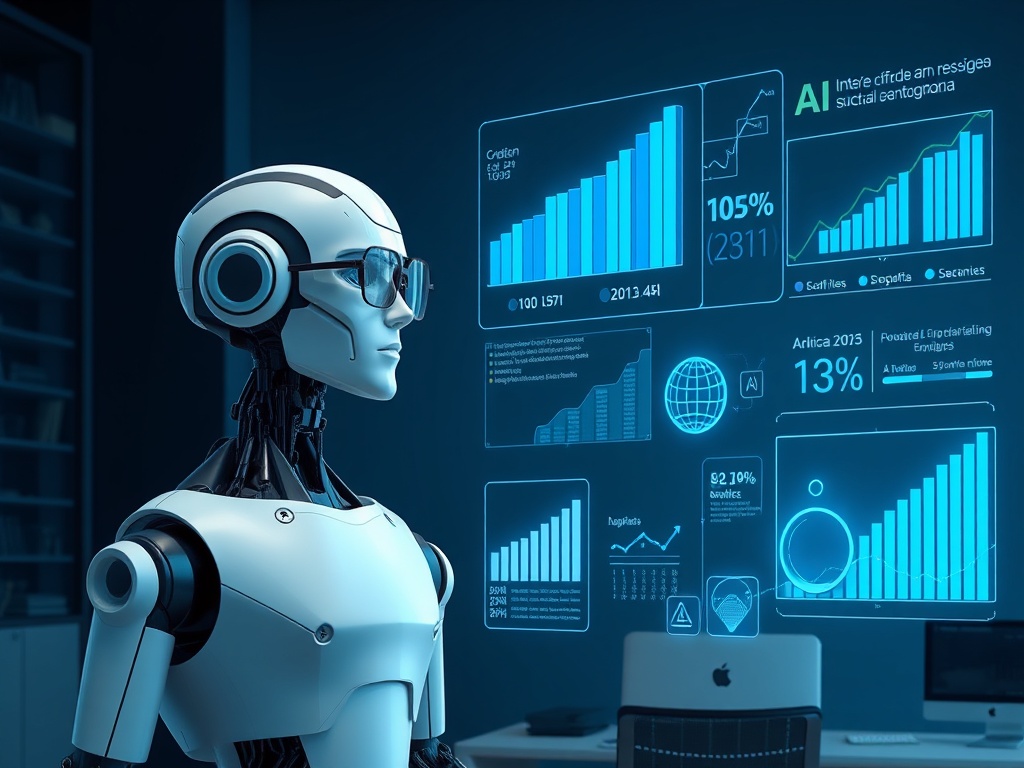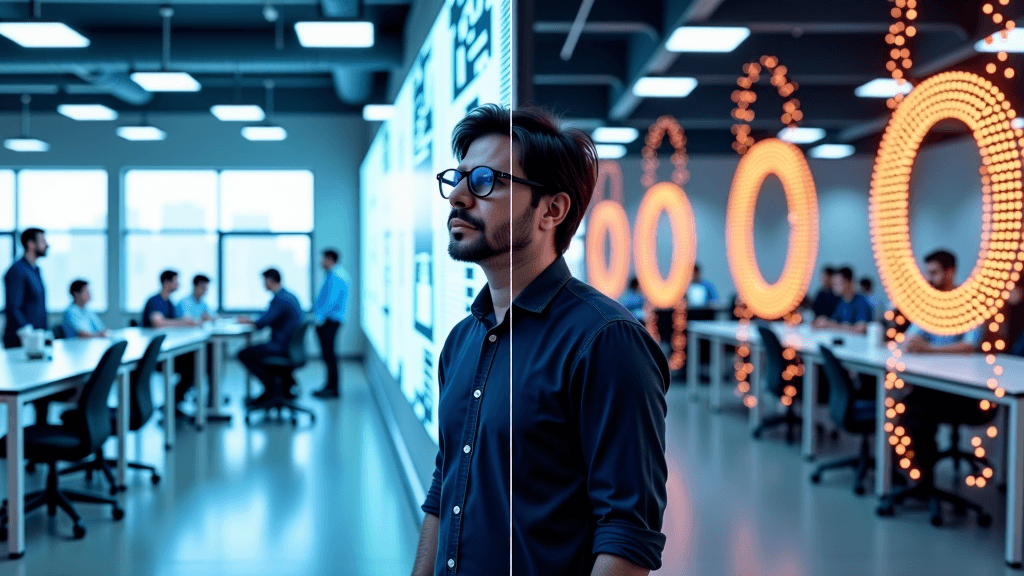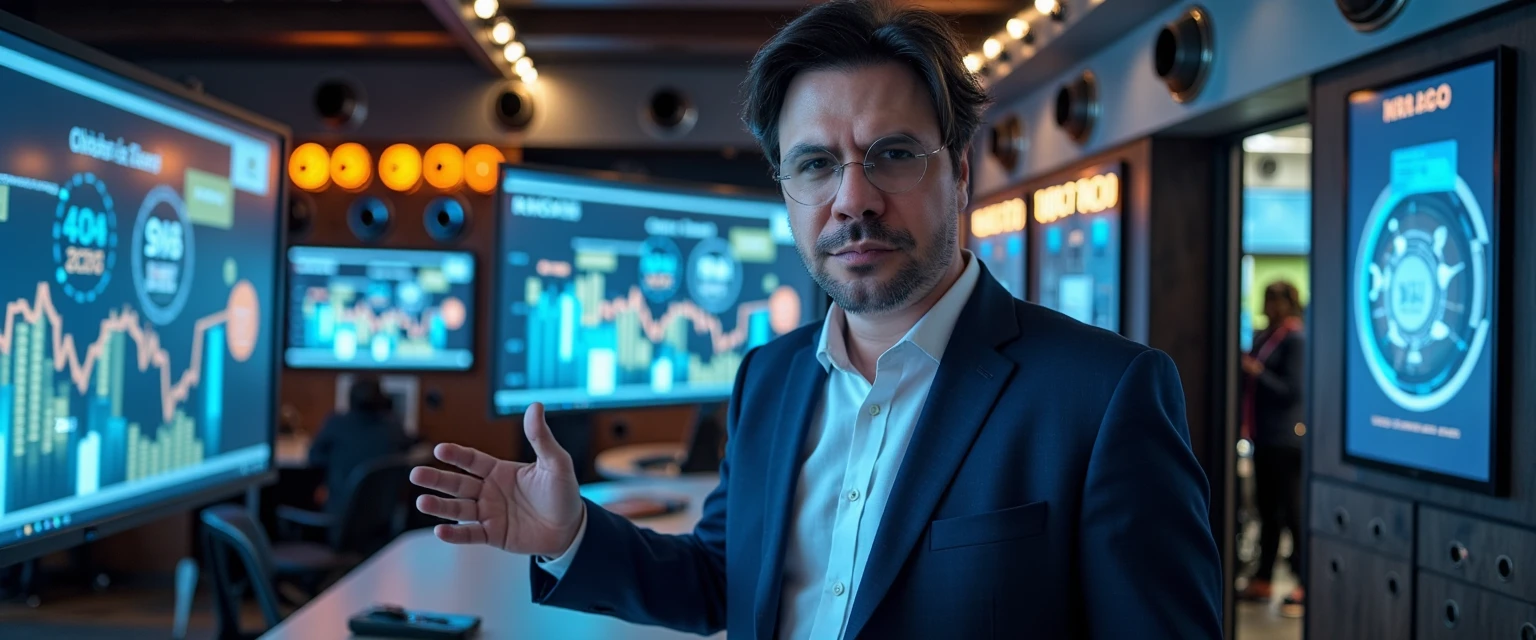AI Radar: From Salary Boom to Synthetic Nude Danger — What Happened in the Last 24 Hours
June 7, 2025 | by Matos AI

Artificial intelligence continues to transform various sectors of Brazilian society at a rapid pace. In the last 24 hours, we have seen everything from impressive salary growth in AI-related roles to troubling ethical issues involving young people and image manipulation. Let’s take a look at the main developments and their implications for the Brazilian innovation ecosystem.
Salary Boom in AI Roles: Agribusiness Leads Growth
One of the most shocking news stories of the last few hours reveals that job advertisements requiring artificial intelligence skills have increased by 284% in Brazil in just three years. According to data published by Valor Econômico, these ads jumped from 19,000 in 2021 to a staggering 73,000 in 2024.
The data that caught my attention the most was the fact that agribusiness stood out as the sector with the highest growth in demand for AI-related positions, with an extraordinary increase of 600%. This number not only confirms the digital transformation of the field, but also reinforces what I have observed in my work with agtech startups: Brazil is positioning its main economic sector at the global technological forefront.
Join my WhatsApp groups! Daily updates with the most relevant news in the AI world and a vibrant community!
- AI for Business: focused on business and strategy.
- AI Builders: with a more technical and hands-on approach.
This trend creates a huge window of opportunity for professionals who master both the agricultural context and emerging technological skills. The combination of sector knowledge with AI capabilities will be the most valuable competitive differentiator in the coming years.
Goiás Surprises and Consolidates Itself as a National AI Hub
While São Paulo and other traditional hubs often dominate the headlines about innovation, Goiás is emerging as an unexpected player in the Brazilian AI scene. According to report from Folha de S.Paulo, the state is consolidating itself as a center of innovation in artificial intelligence, even attracting the attention of Nvidia, a global giant in the sector.
The arrival of supercomputers and significant investments, combined with a state policy to attract investment and the creation of the Center of Excellence in Artificial Intelligence, demonstrate how well-executed regional development strategies can transform entire ecosystems.
This movement in Goiás perfectly exemplifies what I always defend in my lectures and mentoring sessions: successful innovation ecosystems depend more on coordinated public policies and strategic vision than on pre-existing geographical advantages. The Goiás case is a model that other Brazilian states should study and adapt to their realities.
Marisa Maiô: When AI Goes Viral and Questions Our Creative Limits
In the entertainment field, the phenomenon “Marisa Maiô” — a fictional talk show created with the help of AI — surpassed 1.6 million views on social media. According to Sheet, the parody created by artist Raony Phillips used Google's Veo3 to generate the digital presenter.
The case is fascinating because it demonstrates how AI is democratizing the production of high-quality audiovisual content. An individual creator has managed to produce something that, just a few years ago, would have required a full production and visual effects team.
Even more interesting was the creator’s account of how “AI generated many bad results before reaching the final product.” This observation reinforces something I always tell entrepreneurs: AI does not eliminate human work, but transforms its nature. The difference lies in the curation, creative direction and the ability to iterate until the desired result is achieved.
The Presidential Alert: AI and Political Disinformation
In a more worrying scenario, President Luiz Inácio Lula da Silva issued a strong warning about the manipulation of the population by algorithms and the potential of AI for disinformation in electoral campaigns. According to the Earth portal, during a forum in Paris, Lula highlighted the need for strict controls on the use of these technologies to preserve the truth in electoral information.
The president's concern is not unfounded. According to the State of S. Paulo, political campaigns are already using AI to create content, even with the next presidential election more than a year away. This acceleration raises urgent questions about the ethics and veracity of political information in circulation.
In the work I do with organizations and startups, I have observed that the regulation of AI in sensitive contexts such as elections is still in its infancy in Brazil. We urgently need a broader debate on algorithmic governance that involves multiple actors in society, including developers, policymakers, academics and civil society.
The Dark Side: AI-Created Nudes at a School in Minas Gerais
Perhaps the most disturbing case of the last 24 hours was reported by State of Minas Gerais and G1. Students at Colégio Santa Maria in Belo Horizonte used artificial intelligence to create fake images of naked classmates, generating a serious case of digital harassment.
The victims reported experiences of fear and anxiety, while the school took measures such as reporting the case to the Guardianship Council and the Public Prosecutor's Office. According to the newspaper O Tempo, the affected students are demanding stricter action from the institution.
This episode is a red alert about how technology can be used in harmful ways when there is no proper digital education. It is not enough to teach technical skills; we need to educate ethical and responsible digital citizens. In my work with educational institutions, I have emphasized the need to include digital ethics as a core component of the curriculum, not as an optional appendix.
The Precariousness of Early Career Development in the Age of AI
Another emerging concern concerns the impact of AI on the early careers of young professionals. According to a report by Earth, the real fear is not losing your job to AI, but rather being stuck in entry-level roles while the technology advances, making professional development difficult.
Automation is particularly affecting the entry of interns and recent graduates into the market, reducing crucial opportunities for learning and skills development. This trend creates a paradox: the more we automate entry-level tasks, the fewer opportunities we create to train professionals who can take on more complex roles in the future.
This is a topic I have been addressing extensively in my talks on the future of work. Organizations need to rethink their internship and trainee programs to create learning experiences that complement, rather than compete with, automation.. In my mentoring work, I help companies design these new development journeys that prepare young talent to collaborate with AI systems, not just perform repetitive tasks.
New Ways to Monetize AI Services
Finally, we observed a significant shift in the monetization strategy of AI services. According to the Earth, instead of just charging for premium versions, companies are adopting models that limit free usage and charge for excessive consumption.
This shift in strategy raises important questions about democratizing access to advanced AI. While it is natural for companies to seek sustainable revenue models, financial barriers can widen existing technological inequalities.
In my work with startups, I have been warning about the importance of considering inclusive business models that allow scaling without leaving important segments of the population behind. True innovation needs to be accessible to generate positive social impact at scale.
Navigating the Future of AI in Brazil
The news from the last 24 hours shows that Brazil is increasingly integrated into global AI trends, both in positive aspects and in challenges. We are seeing wages increase, regional hubs develop and creative cases emerge, but we also face serious ethical issues and risks of amplifying inequalities.
The moment demands a balanced approach: neither naive techno-optimism that ignores risks, nor paralyzing techno-pessimism that dismisses opportunities. We need a critical and constructive vision that allows us to harness the transformative potential of AI while mitigating its risks.
In my mentoring sessions for companies and entrepreneurs, I work precisely on this line of balance, helping organizations implement AI strategies that are both innovative and responsible. The path to a fairer and more prosperous technological future necessarily involves conscious decisions that we make today about how to develop and regulate these technologies.
✨Did you like it? You can sign up to receive 10K Digital's newsletters in your email, curated by me, with the best content about AI and business.
➡️ Join the 10K Community here
RELATED POSTS
View all



